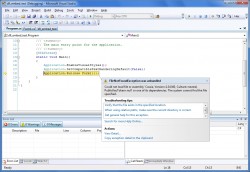It appears that there was some confusion over the mention I made of free OGG files and how to convert them to regular MP3s in the PC Mechanic Newsletter #162. I tried to be as brief, yet as informative as possible, so I’ll go into OGG files and the conversion process in more detail.
Basically, OGG files are an alternative audio format, much like FLAC files. They are meant to offer a different method of compression to bring you better sound quality while maintaining a relatively small filesize (which comes out to be about the same size as an MP3 in this case).
OGG is an open source, free, and unpatented audio format in the public domain and is freely available for commercial or noncommercial use. So, you can use it anywhere, anytime, and for any purpose, which is one of the reasons why it has been utilized by Wikipedia.
The full name of the audio compression project is called “Ogg Vorbis”, and you can take a look at the official website here: http://www.vorbis.com/
The overall project not only relates to audio, but video as well. So, feel free to browse the FAQs and other links and downloads they have available.
Now, for the fun part: OGG files are not widely supported, especially in this era of MP3 players. Many people who have MP3 players are usually restricted to a proprietary Apple file formats (M4A or M4P), or proprietary Windows formats (WMV), or other well-known, but oddball audio formats, such as MP4 or AIFF. However, most MP3 players have one thing in common: they all can play MP3 files. MP3 files, in this case, are the lowest common denominator because nearly every audio device can use them, they can be reasonably small files (2-10MB depending on length and quality), and they have no built-in copyright management or Digital Rights Management (DMA) capabilities. This is while many listeners like them, and why companies developed and continue to release proprietary audio formats supporting DMA protection schemes.
Long story short, OGG files aren’t always supported, and since most people prefer MP3 files for portability and usability and whatnot, I thought I’d offer a tip on how to convert the OGG files found on Wikipedia’s sound section (sounds and music in the public domain–free for you and me) to MP3s. If you simply want to listen to these OGG audio files, Winamp, VLC, Windows Media Player, and a number of other up-to-date media players will be able to handle them.
The tool I like to use for most of my audio projects is called Goldwave, and I stumbled across it a number of years ago when I pressed the limitations of Windows 98’s Sound Recorder. This tool is simply a preference of mine because it has been able to handle lots of different formats. Now, if you are an audio professional in the studio…this tool probably isn’t for you because there are some technical limitations, which I have been slowing learning about. But for the purposes of this file conversion, it works fine.
Goldwave is a shareware application, and is limited by 150 commands per session (a copy and a paste counts as two commands), but for the batch conversion, it falls well within that limitation. If you want to try to find a freeware tool that will do the same thing, feel free to email me or make a comment in the blog here because I wasn’t able to locate a freeware audio tool for this specific purpose.
So, without further ado, here’s the step-by-step instructions:
Open up Goldwave and go to File > Batch Processing.
Click on the “Convert” tab.
Tick the checkbox labeled “convert files to this format”, select “MPEG Audio (*.MP3)” from the first dropdown menu.
For the second dropdown menu, I’d suggest selecting “Layer-3 ACM, 44100Hz, 192 kbps, joint stereo”. This is the quality at which the MP3 will be saved.
Next, click either “Add Files” or “Add Folder” on the upper right-hand side of the window to add individual OGG files or a folder of OGG files. Once you hit “Begin” the conversion process will start, and depending on the number of files you’re converting, you might have time to either grab a snack or take a trip to the mall. By default, these new MP3 files will be stored in the directory(ies) where you have the OGG files stored.
Once the conversion process is complete, you can either delete the OGG files, or try the conversion process again with different audio quality settings if you’re not happy with the MP3s that came out. Once you’re satisfied, you will no longer need the OGG files.
And that’s about it. Happy listening!




 AdamTheTech.com and respective content is Copyright 2003-2025.
AdamTheTech.com and respective content is Copyright 2003-2025.